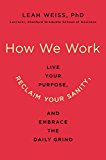How We Work: Live Your Purpose, Reclaim Your Sanity, and Embrace the Daily Grind
How We Work: Live Your Purpose, Reclaim Your Sanity, and Embrace the Daily Grind
“I have long thought that what the Buddha taught can be seen as a highly developed science of mind which, if made more accessible to a lay audience, could benefit many people. I believe that Dr. Weiss’s book, in combining such insights with science and good business practice, offers an effective mindfulness based program that many will find helpful.” –His Holiness, the Dalai LamaA practical guide to bringing our whole selves to our professional work, based on the author’s overwhelmingly
Price:



Each of us can find purpose in what we do, once we uncover what our mission is in this world.,
In âHow We Work: Live Your Purpose, Reclaim Your Sanity, and Embrace the Daily Grindâ Leah Weiss tells us how our âscarcity mindsetâ is affecting our lives at work and at home, and actually keeping us from finding the fulfillment we so crave.
We are unhappy and unsatisfied with our jobs. We work long hours, skip vacations, come in when we are sick and are generally stressed out and fed up. Busyness a status symbol, even though there is plenty of data to show that it actually reduces productivity and increases stress and associated risks.
Lean suggests we write ourselves a personal mission statement, and then consider how our personal statement intersects with our daily work. For example: a janitor in a hospital can see that her daily work of reducing the potential for infection in the wards could save many lives, reduce the risk of infection and outbreaks in the community. Her work serves a larger purpose and her own mission statement to make a difference in the world.
Each of us can find purpose in what we do, once we uncover what our mission is in this world. To do that, we have to stop and see our connection with the bigger picture, to pay attention to the mindset we are in right now and how it aligns with our higher purpose.
If you think your job is meaningless and irrelevant. Then it IS.
In the book, Leah walks us through the steps to really defining your purpose. TRY it.
Worthwhile Read!,
Well-Written Message for Personal and Professional Strategies in the Workplace,
Lizz A. Belle (Eugene, OR United States) –
The book is divided into three sections:
Part 1: Having a Purpose at Work
Here the author extolls the value of mindfulness in the workplace (and in life). By taking self-responsibility for our actions/reactions and working with Purpose, we can begin to heal personally and professionally.
Part 2: Bringing Our Whole “Selves” to the Office
Cultivating compassion for others and nurturing oneself are key to changing our perspective and integrating life and work. There is also a chapter on the wisdom of emotions that moves beyond suppression as an unhealthy coping mechanism to mindfulness strategies for embracing emotional intelligence.
Part 3: Failing and Reflecting
Reflection is the hallmark of success – not the lack of failure. The ability to individually and collectively pause, step back and reflect promotes seeing experience and behaviors from a different perspective and to move forward with a more open, creative stance.
While I enjoyed the book and the author clearly has a talent for presenting her timely message, I did not find anything innovative in the chapters. If you are new to the whole arena of progressive personal and professional management, this is a great primer. However, if you have been engaged in this literature over the past 20 years, you may find it a great reference book, but not necessarily inspiring. Nevertheless, this is a message that is really needed in our current political/business milieu and I recommend it for anyone seeking a greater purpose whether you have a “job,” a “career,” or a “calling.”